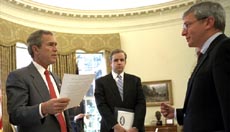
|
Achieving Financial Management Objectives Through Collaboration
Seventeen years have passed since the enactment of the Chief Financial Officers (CFO) Act of 1990. A primary objective of the Act was instilling financial management disciplines in all Federal agencies - better accounting of assets and liabilities, accurate tracking of receipts and payments, and strong controls to mitigate waste, fraud, and abuse. The President's Management Agenda (PMA) reinforces this objective by holding agencies accountable for key financial management results, such as meeting reporting deadlines and achieving a "clean opinion" (or passing score) on financial statement audits. Federal agencies have come a long way in meeting these objectives. In the mid-1990's, only a few agencies were able to achieve a clean opinion on their statements. Until a few years ago, most Federal agencies took as long as five months after the fiscal year to publish their financial statements. Today, all major agencies issue their financial statements within 45 days of fiscal year end and a large majority of agencies, representing more than 75% of all Federal expenditures, achieve a "clean opinion." What steps must the Federal financial community take to build on these results going forward? One priority identified by the CFO Council (CFOC) and the President's Council on Integrity and Efficiency (PCIE) is strengthening collaboration and communication between the CFOs and Offices of Inspectors General (OIG). Specifically, with the acceleration of financial reporting deadlines, there is greater need for effective coordination between the CFO and OIG in the preparation of audited financial statements. Roles and responsibilities must be clear, communication on emerging issues must occur early and often, and the milestones and action items each office is responsible for must be part of an integrated project management plan. With these principals in mind, the CFOC and PCIE came together to develop the Best Practices Guide for Coordinating the Preparation and Audit of Federal Financial Statements, issued by OMB earlier this month. The Guide consists of 12 different "best practice" areas that emphasize frequent communication, agreement on content and timeframes for deliverables, clarity on roles and responsibilities, joint planning, and implementation of lessons learned from prior years. The Guide also includes a Financial Statement Audit Timeline that establishes "high-level" key dates and deliverables that can be adopted by an entity as its own timeline. OMB, the CFOC, and PCIE encourage the Guide's distribution to individuals responsible for coordinating the preparation and audit of Federal financial statements. We, as the Federal financial management community, are committed to realizing and achieving the financial management objectives envisioned by the CFO Act. To this end, OMB, the CFOC, and PCIE will continue to collaborate on projects and initiatives that support sound financial management disciplines, processes, and practices. The Best Practices Guide is available via the Web on IGNET.gov at http://www.ignet.gov/pande/audit/affs0907.pdf and on CFO.gov at http://cfoc.gov/documents/Coordinating-Prep-Audit_Fed_Financial_Statements.pdf. |